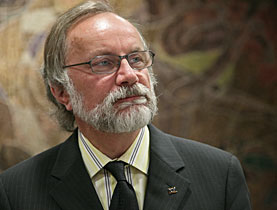Parliament reopens debate over EU labour deal

Relations with the European Union – Switzerland's most important trading partner - are at the centre of a new round of debates in parliament this week.
The extension of a labour agreement – also known as the free movement of people accord – to the newest EU member states Bulgaria and Romania is linked to the continuation of a set of bilateral treaties with Brussels. A row over tax issues further complicates matters.
Monday’s debate in the Senate marks the beginning of parliamentary proceedings, which will continue in the House of Representatives in the summer. They could culminate in a nationwide vote by May 2009.
“The free movement of people is the key element for the economy and growth. The continuation and extension of the accord consolidates relations with the EU,” the Swiss-EU Integration Office said.
The four main political parties, as well as the business community, agree in principle on the importance of the EU market for Switzerland. But they differ in their approach and have set preconditions on extending the labour accord.
The rightwing Swiss People’s Party wants to put pressure on Brussels in a dispute over preferential tax rates for companies from the EU in Switzerland.
“We are only prepared to discuss the labour accord once the EU guarantees it won’t interfere in the Swiss tax system,” said People’s Party spokesman Alain Hauert.
The party is against extending the accord to Bulgaria and Romania, and has threatened to force a nationwide vote on the issue.
Safeguards and threats
On the other side of the political spectrum, the centre-left Social Democrats – in line with trade unions – are calling for additional safeguards by the government to crack down on abuses, notably employers in the construction industry undercutting standard wage levels.
“We are in favour of extending and continuing the labour accord. But we have to be aware that voters will only approve it if protective measures are improved,” a party statement said.
The Trade Union Federation comments that failure to introduce adequate measures could carry a high cost. The unions could deny the government their support in a nationwide vote – or even join forces with the People’s Party.
The two centre-right parties in the government, the Radicals and the Christian Democrats, stress their commitment to the bilateral accords between Switzerland and Brussels.
They consider the labour accord in force since 2002 to be beneficial to Switzerland.
The Radicals and the Christian Democrats, which together hold a majority in the Senate, have welcomed the terms negotiated by the government for a gradual opening of the labour market to Bulgaria and Romania.

More
EU bilateral accords
Referendum
The debates in parliament are widely expected to focus on technical issues surrounding the probable nationwide ballot.
The extension of the labour deal to the latest two EU members is indirectly linked to the continuation of the accord with the other 25 member states.
The EU ambassador to Switzerland, Michael Reiterer, has made it clear that Brussels will not tolerate Switzerland treating one state differently from others.
“The free movement of people is valid for all 27 members,” he said.
But he is confident that Swiss voters will support the government in any referendum – on Bulgaria and Romania or on the general continuation of the labour treaty beyond 2009.
No date for the ballot has been set, but it would take place by mid May next year.
swissinfo, Urs Geiser and Etienne Strebel
The EU, with its 490 million consumers, is Switzerland’s most important trading partner.
Switzerland’s business community has come out in favour of extending and continuing the labour accord, according to a survey published earlier this month.
About 97% of the companies and associations surveyed by the Swiss Business Federation supported the free movement of workers with Bulgaria and Romania.
About 50% of the companies surveyed by the Association of Small and Medium-Sized Enterprises came out in favour of the move.
Voters in 1992 narrowly rejected joining the European Economic Area treaty, a halfway house to EU membership.
Instead Switzerland and the EU concluded 16 bilateral accords, which came into force in 2002 (extended in 2006) and 2005 respectively. They mainly cover trade and labour as well as asylum, customs and tax issues.
Under the terms of the first package of bilateral treaties with Brussels Switzerland can review the labour deal by mid-May 2009. Refusal to continue the deal would result in the whole set of accords being suspended.
Negotiations are underway on an electricity agreement. Switzerland also aims at concluding a free-trade accord on agriculture.

In compliance with the JTI standards
More: SWI swissinfo.ch certified by the Journalism Trust Initiative












You can find an overview of ongoing debates with our journalists here . Please join us!
If you want to start a conversation about a topic raised in this article or want to report factual errors, email us at english@swissinfo.ch.